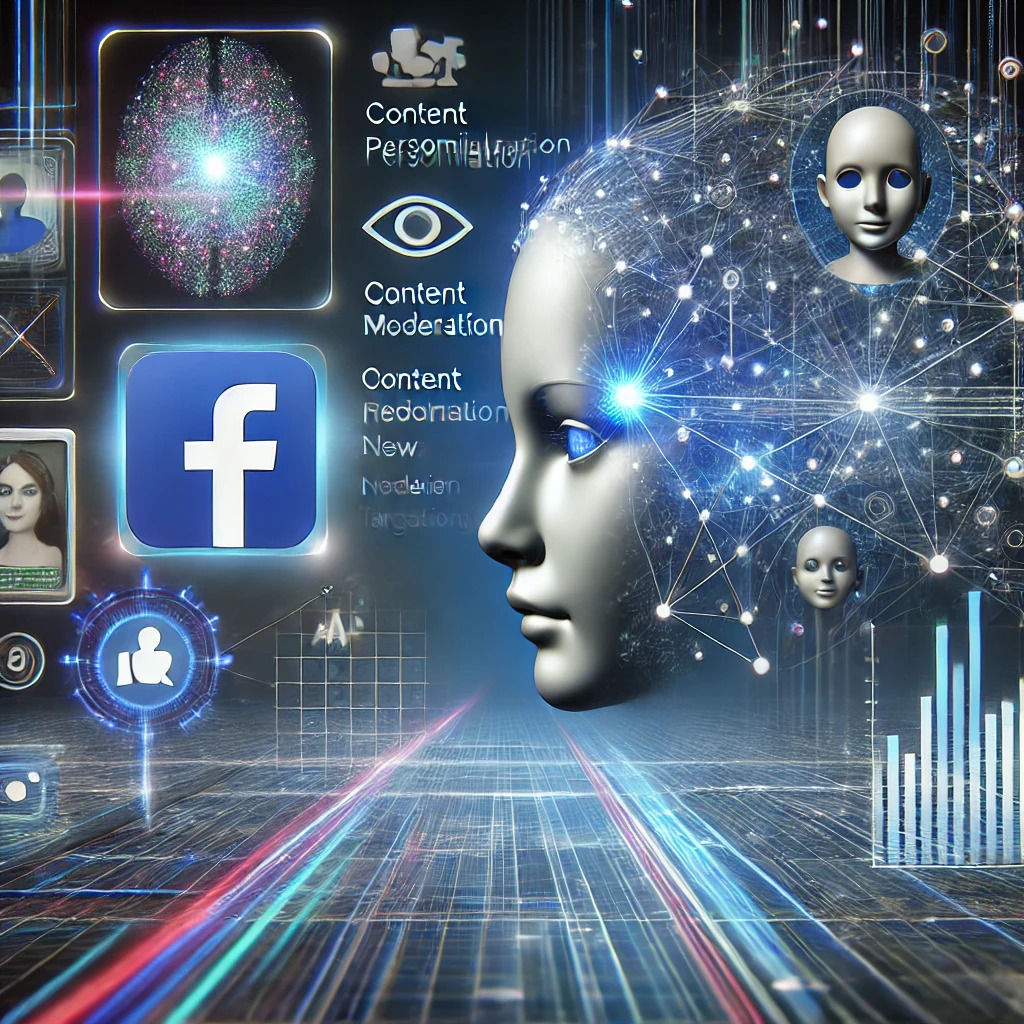Artificial Intelligence (AI) has become a driving force behind the rapid evolution of technology, transforming how businesses and individuals interact with digital platforms. Among the many companies utilizing AI, Facebook stands out as a leader, integrating AI into nearly every aspect of its platform to enhance user experience, improve functionality, and enable innovation. In this article, we will delve into Exploring Facebook’s AI Technology, uncovering the systems and applications that power the world’s largest social media network. At Bmarkify, we aim to shed light on how these advancements are shaping the digital landscape.
AI at the Core of Facebook’s Operations
Facebook’s AI technology is designed to process and analyze vast amounts of data generated by its 2.9 billion monthly active users. This data fuels AI algorithms, which perform tasks ranging from personalizing user experiences to enhancing platform security. Here’s how AI works at the core of Facebook’s operations:
1. Content Personalization
One of the most prominent applications of AI on Facebook is content personalization. AI algorithms analyze user behavior, including likes, shares, comments, and time spent on posts, to curate personalized news feeds. This ensures that users see content most relevant to their interests, keeping them engaged and connected.
Facebook’s machine learning models use neural networks to understand user preferences and predict what content will resonate with them. By continually learning and adapting, these algorithms deliver a highly customized experience for each user.
2. Facial Recognition Technology
Facial recognition is another area where Facebook’s AI excels. The platform’s AI-driven facial recognition system, DeepFace, can identify individuals in photos and videos with remarkable accuracy. This technology simplifies tagging friends in photos, enhances photo organization, and improves the user experience.
While this feature has faced privacy concerns, Facebook has implemented measures to give users control over facial recognition settings, allowing them to manage how their data is used.
3. Content Moderation and Safety
Maintaining a safe and inclusive platform is a top priority for Facebook, and AI plays a crucial role in achieving this. AI-powered systems monitor and filter content to detect and remove harmful or inappropriate material, such as hate speech, violence, and misinformation.
Natural Language Processing (NLP) and computer vision technologies enable AI to understand text, images, and videos, identifying violations of community standards. These systems operate 24/7, ensuring swift action to protect users and maintain a positive environment.
4. Ad Targeting and Delivery
Facebook’s advertising platform is one of its most profitable ventures, and AI is the backbone of its success. AI algorithms analyze user data to deliver highly targeted ads, ensuring that businesses reach their ideal audience. This precision targeting improves ad performance and drives better ROI for advertisers.
By leveraging AI, Facebook provides businesses with insights into user behavior, enabling them to create effective campaigns that resonate with their target demographic.
Key Technologies Powering Facebook’s AI
Facebook’s AI technology relies on a combination of advanced tools, frameworks, and infrastructure. Some of the key technologies include:
1. PyTorch
Facebook developed PyTorch, an open-source machine learning framework, to support its AI initiatives. PyTorch is widely used by researchers and developers to build and train neural networks, making it a cornerstone of Facebook’s AI ecosystem.
This framework enables rapid prototyping and deployment of AI models, ensuring that Facebook’s AI systems remain cutting-edge and efficient.
2. FAIR (Facebook AI Research)
Facebook AI Research (FAIR) is the company’s dedicated research division focused on advancing AI technology. FAIR’s work spans various domains, including computer vision, NLP, robotics, and reinforcement learning. Through FAIR, Facebook contributes to the global AI community by sharing research papers, open-source tools, and datasets.
3. Deep Learning Models
Facebook utilizes deep learning models to power its AI applications. These models are trained on massive datasets, enabling them to recognize patterns, make predictions, and perform complex tasks. For example, convolutional neural networks (CNNs) are used for image recognition, while recurrent neural networks (RNNs) handle sequential data like text and speech.
4. Big Data Infrastructure
To support its AI systems, Facebook has built a robust big data infrastructure. This infrastructure processes and analyzes vast amounts of data in real-time, enabling AI models to deliver accurate and timely results. Tools like Apache Hadoop and Apache Spark play a critical role in managing Facebook’s data pipeline.
Applications Beyond Social Media
While Facebook’s AI technology is primarily associated with its social media platform, its applications extend far beyond. Some noteworthy examples include:
1. Virtual Reality (VR) and Augmented Reality (AR)
Facebook’s investment in VR and AR through products like Oculus and Spark AR relies heavily on AI. AI algorithms enhance user experiences by enabling realistic interactions, object tracking, and immersive environments.
2. Healthcare Research
Through initiatives like Facebook AI for Health, the company leverages AI to address global healthcare challenges. From disease prediction to drug discovery, Facebook’s AI technology is contributing to medical advancements.
3. Connectivity Projects
Facebook’s AI technology supports its efforts to improve global connectivity. Projects like Terragraph and Aquila use AI to optimize network performance and expand internet access to underserved regions.
Ethical Considerations and Challenges
As Facebook continues to innovate with AI, it faces ethical considerations and challenges. Privacy concerns, algorithmic bias, and misinformation are some of the critical issues the company must address to maintain user trust and ensure responsible AI use.
To tackle these challenges, Facebook has implemented transparency measures, user controls, and rigorous testing processes. By prioritizing ethical AI practices, the company aims to create technology that benefits society while minimizing risks.
Conclusion
Exploring Facebook’s AI Technology reveals a sophisticated system that underpins the platform’s success. From content personalization to ad targeting, Facebook’s AI innovations have transformed how users interact with social media and digital platforms.
At Bmarkify, we believe understanding AI technology is crucial for businesses and individuals alike. As AI continues to evolve, staying informed about its applications and implications will empower you to leverage its potential effectively. Whether you’re a marketer, developer, or tech enthusiast, Facebook’s AI advancements offer valuable insights into the future of technology and its role in shaping our digital world.







0 Comments